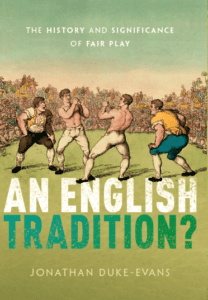Author Interview
Jonathan Duke-Evans
Author of An English Tradition
Jonathan Duke-Evans has a book coming out shortly! It’s called An English Tradition? and it traces the history of the idea of fair play and its place in the British psyche back to the Middle Ages and beyond, looking at the way it manifested itself in sport, the law, religion, marriage, folk tales, and many other areas.
Here Jonathan answers some questions about his book.

What made you want to write about fair play?
I’ve heard a lot over the years about fair play being a big part of the English make-up. I wanted to examine where that idea came from and whether there’s anything substantial at the bottom of it.
And is there?
Well, I don’t think there’s much evidence that the English are fairer than everyone else when it comes to the transactions of everyday life: fiddling expenses, handing in valuables or things like that. But there’s plenty to show that the English demand very high standards of fair play from their institutions – governments, law courts, sporting events – and accept that they have a reciprocal obligation to practise it.
How do you think that came about?
To my surprise, I found a lot of evidence for these attitudes going back to the Middle Ages. You can find them in the origins of English law and in the oldest Robin Hood tales. You can find them in the code of chivalry too, and although that applied all over western Europe it was in England that you start to find the values of chivalry applied to ordinary people, not just to knights.
Are we only talking about England here...What about the rest of Britain?
I found that the idea of fair play was as strong in Scotland as in England. The first use of the phrase “fair play” in its full modern meaning comes, I argue, in Scotland at the end of the fifteenth century

Do you get the same idea in other countries?
Every civilisation has its own idea of justice. But apart from the countries that have been heavily influenced by Britain, like Australia and to some extent the USA, I don’t think there’s anywhere in the modern world that has quite the same idea of fair play as a concept that is identified as a central feature of the national psyche. You do get some very similar ideas, though, in ancient Greece and Rome, and I’ve looked at these closely in the book.
Some people think fair play was really invented when the public schools drew up the first rules for cricket, football, and the other games that have come to dominate the world. Do you agree?
No, I don’t. These games were popular games for centuries, played by well-understood rules, for centuries before they were codified in our public schools and universities. Standardising the rules and writing them down was a huge step forward, but it wasn’t the start of the history of sport by any means.
“Fair play” sounds a bit white, a bit male?
Originally, yes, of course it was. But it’s been fascinating to see how the concept widened over time, tracing the changes through the writings of people like Mary Astell, the first great English feminist, and Dadabhai Naoroji, who campaigned for a better deal for India from its Victorian rulers.
And what about fair play today? Does it still matter?
Most of the time when you hear people talking about fair play, they just mean “well done” or “no problem” or something similar. They’re not really talking about fairness. But the underlying attitude to life is still very much there – but these days we might call it “levelling up”.
Where and when can we buy An English Tradition?
You can buy it directly from my publisher’s online shop, or find it on Amazon and good bookshops, we expect it to be available in Winter 2022. For a signed copy, pre-order from Pat Oakley Publishing’s website shop.
